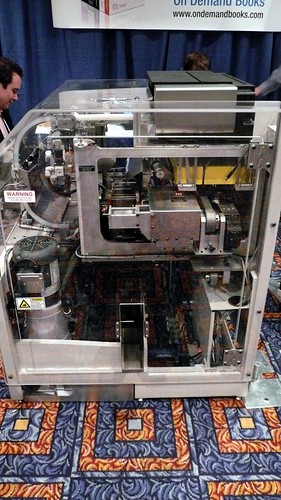Reminder: Chapbook Fair Starts Today
If you’re not a New Yorker this post doesn’t have a lot for you–sorry–but if you’re in the city and have some free time today or tomorrow, think about coming by the CUNY Celebration of the Chapbook. There’ll be panels, and a bookfair, and whatall. Some of the presses who will be there- Belladonna, BookThug, Dancing Girl, Diagram, Sarabande, Pilot, Octopus, Small Fires, X-ing Books (I’ll be working their table, so please drop by) and many more.
The bookfair will take place from 10 am – 6 pm on Thu, April 23 and from 10 am – 4 pm on Fri, April 24. Please arrive to the Elebash Recital Hall lobby, where the bookfair is taking place on Thu, at 9:30 AM to set up. The CUNY Graduate Center is located at 365 Fifth Avenue and 34th St, diagonally from the Empire State Building, and you’ll see the Elebash Recital Hall on the left side of the Grad Center lobby when you walk in – can’t miss it.
Booklyfe X, Return of the Booklyfe, Booklyfe Must Die

Really disturbing.
So much internet today. I don’t even know how to start. Let me say, though: There’s too much to here for me to distill & tease with quotes from the individual articles, so please have faith and click through to the pieces. It’s all very good. Let’s jump in:
Over at The Millions, the venerable Garth Risk Hallberg has posted the first installment of a three part series talking about the future of literary journalism, i.e. book coverage, titled Part I: R.I.P., NYT? This is a really smart piece of criticism; it defines ‘the problem’/offers solutions/peers into the future. I look forward to the rest. Plus, it includes shoutouts for The Rumpus and The Quarterly Conversation, two of my favorite sites, so, Word.
And here’s an interview with N Frank Daniels at Dogmatika. Really interesting interview. Daniels originally self-published his first novel, and marketed it creatively, and then was signed a two book deal with Harper Perennial. And I have to say: Dogmatika is housing some of the best author interviews I’ve read. Great job, folks.
More after the jump.
Black Tooth Grin: The High Life, Good Times, and Tragic End of “Dimebag” Darrell Abbott
 I remember that I was dicking around at a Sydney Internet café in 2004 when I opened an email from my mom informing me that Pantera guitarist Dimebag (né Diamond) Darrell had been murdered by a crazed fan. You’d think that she was telling me my brother had died. The pain hasn’t faded with time. So when I received a galley from De Capo of the forthcoming Dime biography, I thought, “Hell, it’s about time.” The book comes out in May, and it will hold a place of honor on my bookshelf. You hear that, Jimmy Chen? Honor!
I remember that I was dicking around at a Sydney Internet café in 2004 when I opened an email from my mom informing me that Pantera guitarist Dimebag (né Diamond) Darrell had been murdered by a crazed fan. You’d think that she was telling me my brother had died. The pain hasn’t faded with time. So when I received a galley from De Capo of the forthcoming Dime biography, I thought, “Hell, it’s about time.” The book comes out in May, and it will hold a place of honor on my bookshelf. You hear that, Jimmy Chen? Honor!
DOES ANYONE EVER THINK “I AM THE SHIT” AFTER WRITING SOMETHING OR GETTING SOMETHING PUBLISHED?

at the risk of eliciting the charge of “stupidest ever” from justin taylor, i realized today that i have never felt like i was the shit for having done anything. granted, i am assuredly a piece of shit, and not at all successful in some ways, but has anything you’ve done made you think, “i am the shit?” usually, if i get something published this is what happens: i go “hell yeah” in my head while nodding, and then i think “wait, am i really happy?” then the feeling is gone. is it good to think, “i am the shit?” or is it bad? does it help you or does it hurt you? i don’t mean these questions as hypotheticals, i mean, how do you the reader feel. if you don’t want to discuss that, then you can use the comments sections to demean me. oh wait, i remember this one time i was at a gym and i pointed to a garbage can and said to the person next to me, “check this out.” then i punted a football right into the garbage can. i definitely thought, “i am the shit” after that. do you feel more like the shit when you are in a print publication? is it the people also in the publication? is it the editor? the journal?
BetterWorld Books / Dogoodery

The hands are holding the planet in space.
From BetterWorldBooks.com:
We’re breaking new ground in online bookselling. We believe that education and access to books are basic human rights. That’s why books sold on BetterWorldBooks.com help fund high-impact literacy projects in the United States and around the world.
All books are available with free shipping to any location within the United States (or $3.97 worldwide). And in case you’re concerned about your eco-footprint, every order is shipped carbon neutral with offsets from Carbonfund.org.
Here’s the best part: In addition to selling new titles, Better World Books supports book drives and collects used books and textbooks through a network of over 1,600 college campuses and partnerships with nearly 1,000 libraries nationwide. So far, the company has converted more than 11 million donated books into $4.5 million in funding for literacy and education. In the process, we’ve also diverted more than 6,000 tons of books from landfills.
That’s right. Free US shipping, cheap international shipping, new & used books, ecologically-conscious shipping, $$$ to charity, and they work with schools/libraries. Oh, and from a quick search of five books in my ToRead list, they have multiple copies of each.
Alright. What’s to like about Amazon anymore?
Bonnie Prince Billy Onion A/V Club Interview

WO: I guess I don’t know where any information other than what I choose to provide on the records is really anybody’s business. That’s kinda it. I understand that doing interviews… Look, the record labels like that to happen, and I understand on some level why they like that to happen, because it provides some sort of eye-catching thing. It’s like some kind of advertising, for a minimum expenditure of energy and money. But to me, the best purpose of an interview would be to illuminate some things about how somebody works for the benefit of somebody else who wants to do those things. And that’s not where most interviews go at all, so to me, they seem like strange exercises in small talk and wasted air.
And printing credits… I think for those of us who make records, it’s our business how we put it together. Same with a book. You know, the publishing industry has somehow avoided having a light shone on their process. In a book, you basically have the name of the publisher and the name of the writer, and you’re led to believe that those are the two things that created this book. And you and I both know that’s not the case. There’s an army of people involved with the production of each book, most essentially the editor or editors who work closely with the writer on shaping and forming and developing a piece of work, plus the writer’s agent, blah blah blah. And yet somehow it doesn’t matter to us that all of that information is never publicly, readily available. Yet we want that on our records.
Youtube teaches me something else about writing: The goomba’s point of view
Here’s a nice, radical shift in the perspective of a story. There’s a guy trying to save a princess. The princess was kidnapped by a tyrant as part of his scheme to control a kingdom. The tyrant has minions. The minions stand between the guy and the princess. The guy is the natural focus of the narrative.
But in this video, a relatively minor character in what we might call the ur-narrative is instead the focus.
Is it as exciting as the traditional, Mario-focused way of telling the story? No, probably not. But it still has a kind of driving tension. You can HEAR Mario’s approach. You know the two goomba’s are done for, which adds a tension to the subtext of their mundane March Back and Forth, Bounce Off the Pipes and Each Other existence. Something sort of interesting is going on here.
So, for homework, write a story from the perspective of someone relatively minor to the story’s ur-narrative.
TANGENT:
According to Urban Dictionary, “goomba” is a slang term for Italian Americans. Cher used to call Sonny Bono a goombah. Being that Mario is a self-identifying Italian American, and Mario spends most of his time stomping on goombas, can we read Super Mario Bros. et al as an allegory for assimilating into a mass culture? Mario must stomp on his personal “goombas” to fit in and get the girl?
Wow: The Espresso Book Machine

Literature Terminator.
From the press release:
Blackwell, the UK’s leading academic bookseller, has unveiled the launch of the 2.0 Espresso Book Machine (EBM) at its flagship store, 100 Charing Cross London. It is the first bookshop installation of its kind within the UK, allowing any book to be selected from an inexhaustible network of titles and prints on demand in just 3 minutes from a digital file onsite, online at www.blackwell.co.uk, or uploaded in person from CDs or flash drives.
This bad boy whips up a book in three minutes. Go on to read more about the implications of such a device.
My take: This is definitely a much more ecologically sustainable process than the standard model of book production, which is exciting. It also completely removes the barrier of entry to producing a book, which, I’d argue, is a very ‘good’ thing; the more art the better. It’s happening all around us; the availability of cheap means of production means that anyone with a computer and a camera can make a movie, anyone with a computer near this behemoth or Lulu.com can make a book, anyone with a computer and Garageband/Audible can make music, etc. Distribution will be the sticking point in media for awhile, and it’s going to get messy. I look forward to help making the mess.
What do you think?
EDIT: Also, a thin treatise on paperback vs. hardback after the jump…
Three Things I’ve Found Interesting Within the Sphere of ‘Booklyfe’, or: Booklyfe 3

This is what all talent/literary/federal agents look like. It's code.
1. Literary agent Nathan Bransford of Curtis Brown, Ltd. is offering readers the chance to play Literary Agent for a Day over at his blog. It’s pretty simple: Read the posted queries, pick the queries you think belong to books about to actually be published, win ______ (he hasn’t specified the prize).
2. Via Matt Briggs, an essay from Frederick Barthelme published in 1988. I’m sure quite a few of you have read this already, but I hadn’t. I think the essay is definitely worth talking about, still.
3. Interview Magazine writes about Five Dials, a .pdf/email distributed literary journal. Hey, who knew this interweb thing could be used for like, literature and stuff?
I’ve already blabbed about this stuff elsewhere, if you’d like a quicker river.
Youtube teaches me something about writing.
I think maybe this has something to say about how significantly tone can shape a story.
We have something familiar—the opening to a sitcom. We haven’t changed a single visual element. We have instead changed the music. And we’ve gone from the fun-loving antics of a rich man and his adopted African American kids, to the disturbing story of a predator clearly intent on abusing and possibly ritually sacrificing two boys he has convinced to get into his limo.
(Is it just me, or does the car seem to be moving slower than it did in the original version with the upbeat music?)
Maybe tonight we should all spend some time trying to retell an old story with a completely inappropriate tone. See what happens.
